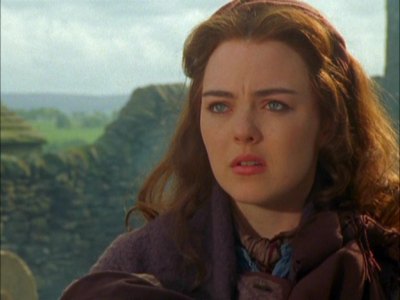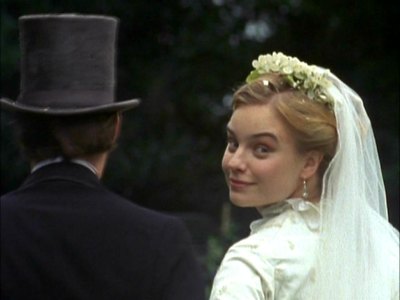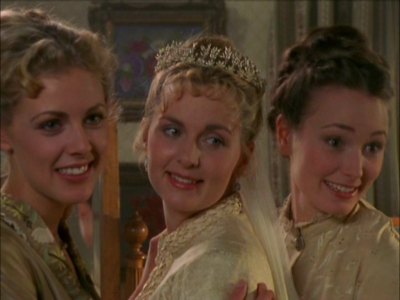| Reviews & Columns |
|
Reviews DVD TV on DVD Blu-ray 4K UHD International DVDs In Theaters Reviews by Studio Video Games Features Collector Series DVDs Easter Egg Database Interviews DVD Talk Radio Feature Articles Columns Anime Talk DVD Savant Horror DVDs The M.O.D. Squad Art House HD Talk Silent DVD
|
DVD Talk Forum |
|
|
| Resources |
|
DVD Price Search Customer Service #'s RCE Info Links |
|
Columns
|
|
|
Catherine Cookson Anthology, The
Koch Vision has released a marvelously entertaining eight-disc collection, The Catherine Cookson Anthology, featuring seven TV adaptations of Britain's most widely read author. Shot on gorgeous locations in North East England, and suffused with cleverly plotted, cleanly delineated melodrama, the films included in this anthology will surprise you with their relative narrative simplicity and power. Films included are 1994's The Cinder Path, 1998's Colour Blind, 2000's A Dinner of Herbs, 1996's The Girl, 2000's The Secret, 1996's The Tide of Life, and 1999's Tilly Trotter.

To be honest, I had never heard of Cookson prior to watching these films. After viewing them, and then researching the author, I was amazed at the loyal readership she had. Born in 1906 in North East England's County Durham, Cookson's life reads like one of her many fictional heroines. Born illegitimate to an alcoholic mother, she grew up with her grandmother, and entered a long period of hard domestic labor, where she managed to save enough money to buy her own home for the purpose of running a boarding house. Married at 34, and unable to have children due to a rare blood disease, Cookson suffered a mental breakdown after her fourth miscarriage, and took up writing as therapy, joining the celebrated Hastings Writers' Group. Her first book, Kate Hannigan was published in 1950, and was quite successful. Eventually, she would go on to write over 100 novels, which were translated into over 20 languages, with sales of over 120 million copies - a phenomenal achievement, particularly when you consider she was suffering from a variety of illnesses during much of her life. She held the title of "Most Borrowed Author" from UK public libraries for over 20 years, and became a Dame Commander of the Order of the British Empire in 1993. A multimillionaire from her book sales, she had come quite some way from her most humble beginnings.
None of her fictional heroines become that rich in any of these TV adaptations of her novels, but each film does focus on a strong-willed, determined, hard-working woman who overcomes obstacles of birth, social class, economic hardship, weak, abusive men, and extraordinary, often-times cruel twists of fate to ultimately find romantic satisfaction and happiness. It may be formula, but it's a proven one, and it works each and every time. Since I haven't read any of Cookson's novels, I want to be clear that I'm praising these TV adaptations. Dedicated readers of Cookson's may or may not find fault with these filmed versions, as is often the case when literary works are brought to the screen. I can only assume since these particular movies proved to be immensely popular each and every time when presented by the U.K.'s ITV Network, that the majority of Cookson fans felt that the movies, at the very least, captured the spirit of her books.
Evidently, Cookson bristled at the notion that her works were simple "romances." She preferred the term, "historical novels," often set in the North East England she grew up in, and for these particular TV adaptations, mostly occurring in the mid-to-late 19th century. It's understandable how one might label these films as "romances," particularly when each has an identifiable arc that resembles that genre of writing. Each film has thematic elements that are revisited in each subsequent work. Unplanned pregnancies out of wedlock are perhaps the most common (and perhaps not surprising considering Cookson's own circumstances). A heroine seeking love, perhaps as an escape from dire social or economic conditions, is also prevalent. Men who successfully woo and take advantage of women, either through money or sex, only to then abandon them for another woman or to lose themselves in drink or self-pity, also frequently crops up. The notion that the common men and women of North East England (Northumberland for most of the film adaptations) are "wild" and "earthy" in comparison to their "betters" is consistently put forth, allowing for Cookson's persistent meditations on the nature of the class system in England (with Cookson scrupulously fair in presenting the good and bad sides of both the upper and lower classes). Murder certainly plays into these stories, with a heroine's fate and happiness suddenly shattered by the death of a relative or lover. The prejudices and social superstitions of both the common people and the upper crust are frequently a catalyst for the life-changing events in the heroines' stories. Cruel twists of fate, often involving sickness or a maiming - certainly a hazard during those times of primitive health care and dangerous working conditions - quite naturally steer events toward melodrama. The notion that each heroine has to endure extreme conditions of depredation, either in physical labor or psychological trauma due to a cruel home life, is often utilized, with the subsequent notion that hard work and determination - as well as basic, decent good will on the part of the heroine - will overcome such obstacles. And of course, finally, the happy ending. All the stories here end happily, with the heroine eventually finding either love, or peace with her situation - or frequently both.
What I found most impressive with the films of The Catherine Cookson Anthology, was an unabashed straightforwardness in presenting these simple yet elemental themes. There's a power in this melodrama (a term that has unfortunately -- and wrongly -- taken on a recent negative connotation), a direct connection to themes and storylines that are almost primeval in their origin and execution, and as such, have a tremendous attraction for us. Certainly all those paperback romances out there aren't "art," but they must be tapping into something fundamental in our craving for basic storytelling, and most certainly, the films of The Catherine Cookson Anthology work at that same level of almost primitive attraction.
Importantly, however, is the skill and care in which these filmed adaptations are brought off. These aren't the equivalents of those shoddy daytime serials on the American networks or the abysmal Lifetime telemovies that mine the same themes but in a most hackneyed manner. There's a real grit to these films, an intended weight of purpose in presenting the stories in as basic yet compelling manner as possible, which is no doubt helped by the superior British thesping that brings these stories to life. Tone is everything in films like these, and anything less than a straight face would risk pushing the material into parody. These adaptations may not be based on Hardy or Joyce or James, but they feel like they are because the filmmakers have respected the integrity of Cookson's elemental themes.
Standouts for the The Catherine Cookson Anthology include A Dinner of Herbs, starring Melanie Clark Pullen, Jonathan Kerrigan, and Tom Goodman Hill, and directed by Alan Grint, an epic-sized tale of revenge and lost love which is quite impressive for its sweep, both pictorially and thematically. Pullen is the perfect Cookson heroine: vulnerable yet with a spine of steel, hopeful for her future even though circumstances look grim, and above all, still willing to be open to love when it truly presents itself. The Girl, directed by David Wheatley and starring Siobhan Flynn and Jonathan Cake (with a nasty turn by Mark Benton as the pathetic/horrid Fred the Butcher), could have played rather luridly, what with all the childhood whippings and the sublimated text of incest and bartered sex, but again, the producers of these films keep focus on the presenting the material straight, and a rather harrowing vision comes forth. Flynn and Cake are quite good together, as well. The Secret, directed again by Alan Grint (a terrific director whose credits include the sensational Chancer series with Clive Owen) and starring Colin Buchanan and Hannah Yelland, is an involving murder mystery with a suitably creepy performance by Stephen Moyer as the sick, perverted Marcel Birkstead. And The Tide of Life features a beautifully modulated performance by Gillian Kearney as the hard-working Emily Kennedy, the scullery maid who openly lives with a man out of love, only to find him weak and disloyal. Ray Stevenson is quite good at making the initially sympathetic Larry Birch an ultimately despicable man, while the vastly underrated James Purefoy isn't seen nearly enough here as kindly Nick Stuart.

Here are the seven films featured in the eight-disc The Catherine Cookson Anthology, as described on the box set's gatefold:
The Cinder Path
The cinder path which led from the MacFell's farmhouse would always symbolize humiliation and defeat for Charlie...until the opportunity arrives for the "loser" to prove himself.
Colour Blind
Bridget seriously offends her conservative family for marrying an African sailor. After being accused of murder, her husband is forced to leave town. As their daughter grows up, she must learn to cope with the racism surrounding her.
A Dinner of Herbs
Hal was just a boy when his father was murdered by the ruthless Dan Bannerman. Now, with a family of his own, Hal discovers that the man his daughter hopes to marry is none other than Bannerman's grandson.
The Girl Trapped in a disastrous marriage to local butcher Fred Loam, Hannah must fight for her freedom, her life, and the man she loves.
The Secret
Freddie Musgrave's life is in a state of turmoil when a letter implicates him in murder. Further complications arise when he discovers he has feelings for Belle, a woman married to a madman.
The Tide of Life
This compelling and gritty story, set at the turn of the century, follows the fortunes of young housekeeper Emily Kennedy as she learns harsh lessons about life and love through her relationships with three very different men.
Tilly Trotter
Set in rural England during the 1930s, Tilly Trotter is the compelling story of a courageous young girl, envied by women and lusted after by men, who is accused of witchcraft, and forced to rise above the prejudice of her community.

The DVD:
The Video:
The full-frame, 1.33:1 video transfers for The Catherine Cookson Anthology look quite good, with sharp, clear pictures and nicely balanced color values. Grain is apparent for most, as well as the occasional scratch or dirt speck, but I saw no indication of PAL transfer problems, which is a definite plus.
The Audio:
The Dolby Digital English 2.0 stereo mixes are more than enough for these largely dialogue-driven films. Unfortunately, some of the strong North East English accents might be a little thick at times: optional subtitles or close-captions might have helped, but they're not offered.
The Extras:
There are no extras for The Catherine Cookson Anthology.
Final Thoughts:
Over 21 hours of pure, unadulterated - but powerfully presented - melodrama are on display in the seven film The Catherine Cookson Anthology. Admirably straightforward presentations, benefitting from excellent British casts and location work, keep the simple, elemental intensity of Cookson's work clearly in focus. Storytelling is king here, and you can't help but be drawn in to these primal narratives. I highly recommend The Catherine Cookson Anthology.
Paul Mavis is an internationally published film and television historian, a member of the Online Film Critics Society, and the author of The Espionage Filmography.


|
| Popular Reviews |
| Sponsored Links |
|
|
| Sponsored Links |
|
|
| Release List | Reviews | Shop | Newsletter | Forum | DVD Giveaways | Blu-Ray | Advertise |
|
Copyright 2024 DVDTalk.com All Rights Reserved. Legal Info, Privacy Policy, Terms of Use,
Manage Preferences,
Your Privacy Choices | |||||||














